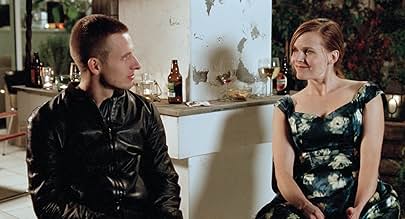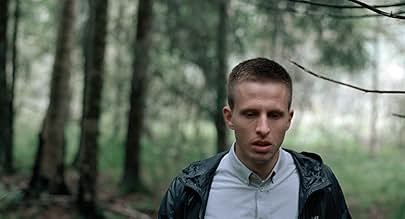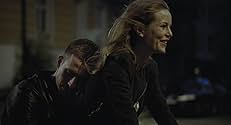IMDb-BEWERTUNG
7,6/10
31.373
IHRE BEWERTUNG
Ein Tag im Leben von Anders, einem jungen genesenden Drogenabhängigen, der sich kurz von seinem Behandlungszentrum beurlaubt, um sich für einen Job zu bewerben und alte Freunde in Oslo zu tr... Alles lesenEin Tag im Leben von Anders, einem jungen genesenden Drogenabhängigen, der sich kurz von seinem Behandlungszentrum beurlaubt, um sich für einen Job zu bewerben und alte Freunde in Oslo zu treffen.Ein Tag im Leben von Anders, einem jungen genesenden Drogenabhängigen, der sich kurz von seinem Behandlungszentrum beurlaubt, um sich für einen Job zu bewerben und alte Freunde in Oslo zu treffen.
- Regie
- Drehbuch
- Hauptbesetzung
- Auszeichnungen
- 19 Gewinne & 21 Nominierungen insgesamt
Aksel Thanke
- Terapeut
- (as Aksel M. Thanke)
Tone Beate Mostraum
- Tove
- (as Tone B. Mostraum)
Empfohlene Bewertungen
I think I learned about this film when I searched for the highest rated films on Rotten Tomatoes. I saw it had earned nearly universal high marks, so I decided to check it out.
It follows a recovering addict named Anders who is granted a leave from the rehab clinic where he is currently residing to go into Oslo for a job interview. While in Oslo, which he has not visited in some time since going to the clinic, he meets a number of old friends, attempts to reconnect with a former girlfriend, and visits some old haunts.
That is essentially all in the way of plot. What makes the film so affecting are the conversations he has with these friends about life, feelings of regret, lost opportunities, etc. The conversations seemed so authentic and realistic; the writers never gave into the temptation of injecting false notes of sentimentality..
Even though Anders is an addict, this isn't really an "addiction movie." His addiction is always there in the background, but the themes that the film explores are far more universal and general. And the lead actor's performance was very poignant and impressive. I definitely recommend this to anybody interested in a strong dialog and character-driven film.
It follows a recovering addict named Anders who is granted a leave from the rehab clinic where he is currently residing to go into Oslo for a job interview. While in Oslo, which he has not visited in some time since going to the clinic, he meets a number of old friends, attempts to reconnect with a former girlfriend, and visits some old haunts.
That is essentially all in the way of plot. What makes the film so affecting are the conversations he has with these friends about life, feelings of regret, lost opportunities, etc. The conversations seemed so authentic and realistic; the writers never gave into the temptation of injecting false notes of sentimentality..
Even though Anders is an addict, this isn't really an "addiction movie." His addiction is always there in the background, but the themes that the film explores are far more universal and general. And the lead actor's performance was very poignant and impressive. I definitely recommend this to anybody interested in a strong dialog and character-driven film.
The opening and closing minutes of Oslo, August 31rst are peerless filmmaking, a simultaneously nostalgic and disturbing slideshow of images from the titular city, which appears as some kind of larger supernatural entity with a will of its own. The film that they bracket is pretty decent too. It's a quiet slice of cinema verite about Anders, a recovering drug addict.
This isn't your standard AA-approved narrative of redemption, and that's what makes it good. Anders discovers that the world outside is frosty, ambivalent towards him, and most of all banal and meaningless. Of course, the difficulty is portraying banality without being banal yourself, and Trier doesn't entirely succeed here. But it does provide, on top of the more philosophical statement, a great representation of the difficulty of getting back into society after leaving it. Oslo, August 31rst is smart enough to see the social barriers that make the standard addiction narrative so deceitful.
Other than the immediately striking opening, there's nothing overtly impressive about this film. It has its flaws, such as the ending, which seems contrived compared to everything that's come before. But it's a quietly solid picture that certainly deserves a little of your time.
This isn't your standard AA-approved narrative of redemption, and that's what makes it good. Anders discovers that the world outside is frosty, ambivalent towards him, and most of all banal and meaningless. Of course, the difficulty is portraying banality without being banal yourself, and Trier doesn't entirely succeed here. But it does provide, on top of the more philosophical statement, a great representation of the difficulty of getting back into society after leaving it. Oslo, August 31rst is smart enough to see the social barriers that make the standard addiction narrative so deceitful.
Other than the immediately striking opening, there's nothing overtly impressive about this film. It has its flaws, such as the ending, which seems contrived compared to everything that's come before. But it's a quietly solid picture that certainly deserves a little of your time.
bitter, cold, gray, powerful. pictures of disillusion. search of yourself in a strange world. desire of new beginning. close doors. out sense meetings. pain and drops of hope. the life has unique sense. the past can not be present or future. the force source of story is its universal value. Anders may be everybody. his trip to a little sense of existence or only for a realistic form of consolation is part of each man or woman. maybe, not so painful. he can be one of Dostoievsky characters. or only a Tchekov page silhouette. but he is more. he is a hero of our time. a kind of Sisif. or only his remains. few beautiful images. a magnificent performance of Anders Danielsen Lie. and a town as skin of fall. nothing else. only a room, a piano, a lake and last day of summer - perfect scene for last step.
Triers second film in his Oslo trilogy depicts the complexities of how it is to return to a familiar place under different circumstances.
In Oslo, August 31st, we meet Anders (Anders Danielsen Lie), a former drug addict. Anders is on his day out from rehab in Oslo to attend a job interview. Before and after the interview, he takes the opportunity to meet up with friends, and problems left undone.
This is one of the best norwegian films out there, mainly because of how it depicts the urban city life in Oslo, and the challenges which follows a recovering drug addict. As a norwegian and a former Oslo citizen, this film hit me hard. With its social realistic style, this film makes you not just reflect upon the lives of drug addicts through the perspective of Anders, but also life in general through the conversation that Anders has with his friends.
Oslo, August 31st is a socratic masterpiece.
In Oslo, August 31st, we meet Anders (Anders Danielsen Lie), a former drug addict. Anders is on his day out from rehab in Oslo to attend a job interview. Before and after the interview, he takes the opportunity to meet up with friends, and problems left undone.
This is one of the best norwegian films out there, mainly because of how it depicts the urban city life in Oslo, and the challenges which follows a recovering drug addict. As a norwegian and a former Oslo citizen, this film hit me hard. With its social realistic style, this film makes you not just reflect upon the lives of drug addicts through the perspective of Anders, but also life in general through the conversation that Anders has with his friends.
Oslo, August 31st is a socratic masterpiece.
10maddo16
The most hard-hitting and resonant film I've seen in a long time, Oslo August 31st sets itself up with serene, fuzzy home footage and tales of blissful memories spent in the titular city of Oslo only to cut to the bleak life of Anders, a former heroin addict on his first day of life out of rehab. Searching for a meaning and a purpose in this new life he finds little in his friends' bourgeois city routines, which he neither desires nor feels he could achieve anyway, and their claims that "it'll all get better" fail to move a mind constantly probing and analysing the reality of his situation.
He soon undergoes an intense conversation in a park overlooking the city with his closest friend, wherein Anders pours out his thoughts of the time the two have spent apart, and the precision of their rapport matched with the lead's acting make the whole scene feel horribly real.
Anders wanders the often-empty city like a ghost, sitting in a café surrounded by the hollow dreams of others ("Plant a tree. Swim with dolphins. Write a great novel") and dwelling on the weight of his own existence. In two minds whether to leave the city, increasingly desperate and always beautifully shot, we follow him through the night until sunrise, when Anders appears to us in a sequence at his most unpredictable.
Undeniably disturbing, yet intimate and tender, this is a film that already feels close to my heart, one unafraid to bring up difficult questions and brilliantly able to provoke an idea of the absurdity of it all.
He soon undergoes an intense conversation in a park overlooking the city with his closest friend, wherein Anders pours out his thoughts of the time the two have spent apart, and the precision of their rapport matched with the lead's acting make the whole scene feel horribly real.
Anders wanders the often-empty city like a ghost, sitting in a café surrounded by the hollow dreams of others ("Plant a tree. Swim with dolphins. Write a great novel") and dwelling on the weight of his own existence. In two minds whether to leave the city, increasingly desperate and always beautifully shot, we follow him through the night until sunrise, when Anders appears to us in a sequence at his most unpredictable.
Undeniably disturbing, yet intimate and tender, this is a film that already feels close to my heart, one unafraid to bring up difficult questions and brilliantly able to provoke an idea of the absurdity of it all.
Wusstest du schon
- WissenswertesRenate Reinsve's feature film debut. She had two lines. She would later reunite with director Joachim Trier, as the lead in Der schlimmste Mensch der Welt (2021).
- PatzerAt the beginning of the film, when he dives into the lake holding a big stone, he is wearing a black jacket, when he emerges from the water he is wearing a white shirt.
- VerbindungenFollowed by Der schlimmste Mensch der Welt (2021)
- SoundtracksPatch To Lucy
Written by E. Skodvin/O. Totland
Performed by Deaf Center
© 2005 Type Records
Top-Auswahl
Melde dich zum Bewerten an und greife auf die Watchlist für personalisierte Empfehlungen zu.
- How long is Oslo, August 31st?Powered by Alexa
Details
- Erscheinungsdatum
- Herkunftsländer
- Offizieller Standort
- Sprachen
- Auch bekannt als
- Oslo, 31 de agosto
- Drehorte
- Henrik Ibsens Gate 36, Oslo, Norwegen(restaurant where Anders meets his sister's girlfriend)
- Produktionsfirmen
- Weitere beteiligte Unternehmen bei IMDbPro anzeigen
Box Office
- Bruttoertrag in den USA und Kanada
- 101.475 $
- Eröffnungswochenende in den USA und in Kanada
- 9.564 $
- 27. Mai 2012
- Weltweiter Bruttoertrag
- 1.481.665 $
- Laufzeit1 Stunde 35 Minuten
- Farbe
- Sound-Mix
- Seitenverhältnis
- 1.85 : 1
Zu dieser Seite beitragen
Bearbeitung vorschlagen oder fehlenden Inhalt hinzufügen

























